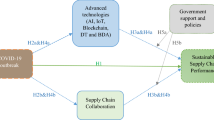Abstract
This article explores the determinants that affect the transportation outsourcing strategy of the express delivery company in Taiwan. The results show that the following situations result in higher outsourcing probability: customer companies belonging to the high-tech industry, customers bringing higher freight revenue, customers having a better relationship with the case study company, and customers’ company having a bigger scale. The findings provide enterprises with a reference of decision making to follow in implementing the transportation outsourcing measure for different customers’ needs. The outsourcing strategy increases the flexibility of operating funds to enhance customer service quality.
Similar content being viewed by others
References
Bardhan I, Mithas S, Lin S (2007) Performance impacts of strategy, information technology applications, and business process outsourcing in U.S. manufacturing plants. Prod Oper Manag 16(6):747–762
Bengtsson L, Haartman R, Dabhilkar M (2009) Low-cost versus innovation: contrasting outsourcing and integration strategies in manufacturing. Creativity Innov Manag 18(1):35–47
Bromage N (2000) Outsourcing: to do, or not to do, that is the question. Manag Account 78(1):22–23
Cooke JA (1997) Ground zero. Logist Manag 36(5):61–62
Dunn RL (1999) Exploring outsourcing. Plant Eng 53(3):123–129
Ellram LM (1995) A managerial guideline for the development and implementation of purchasing partnerships. J Supply Chain Manage 31(2):9–16
Fredriksson A, Johansson E (2009) Integrating logistics into the outsourcing process. Int J Logist Res Appl 12(4):281–298
Gordon KA (1994) Outsourcing information technology: why does it make sense? Fortnightly 132(2):27–30
Jennings D (1997) Building societies and strategic sourcing: criteria and dynamics. Serv Ind J 17(3):397–412
Klepper R, Jones W (1998) Outsourcing information technology, systems & services. Prentice Hall, Upper Saddle River, NJ, pp 249–258
LaLonde BJ, Cooper MC (1989) Partnership in providing customer service: a third-party perspective. Council of Logistics Management, Oak Brook, IL, p 6
Lee JN, Kim YG (2005) Understanding outsourcing partnership: a comparison of three theoretical perspectives. IEEE Trans Eng Manag 52(1):43–58
Lever S (1997) An analysis of managerial motivations behind outsourcing practices in human resources. Hum Resour Plan 20(2):37–47
Lin CC, Ru YH, Lee SC, Zhu Y (2009) An assessment of the usage versus offerings of logistics services in Beijing city, China. In: Proceedings of the eighth international conference on machine learning and cybernetics, Baoding, 12–15 July
Lomas PN (1997) The implications of outsourcing. Frozen Food Age 46(5):33–36
Momme J, Hvolby HH (2002) An outsourcing framework: action research in the heavy industry sector. Eur J Purch Supply Manag 8(4):185–196
Perry CR (1997) Outsourcing and union power. J Labor Res 18(4):521–534
Ponomariov B, Kingsley G (2008) Applicability of the normative model of outsourcing in the public sector: the case of a state transportation agency. Public Org Rev 8(3):253–272
Quinn JB (1999) Strategic outsourcing leveraging knowledge capabilities. Sloan Manag Rev 40(4):9–21
Quinn JB, Hilmer FG (1994) Strategic outsourcing. Sloan Manag Rev 35(4):43–55
Schoemaker PJH (1992) How to link strategic vision to core capabilities. Sloan Manag Rev 34(1):67–81
Sharpe M (1997) Outsourcing, organizational competitiveness and work. J Labor Res 18(4):535–549
Vining A, Globerman S (1999) A conceptual framework for understanding the outsourcing decision. Eur Manag J 17(6):645–654
Acknowledgments
The authors would like to thank the National Science Council of the Republic of China, Taiwan for financially supporting this research under Contract No. NSC 99-2410-H-141-007-MY2.
Author information
Authors and Affiliations
Corresponding author
Rights and permissions
About this article
Cite this article
Lee, CC., Lin, T.T. & Cheng, PC. The determinants of the transportation outsourcing strategy for the express delivery company. Serv Bus 7, 207–225 (2013). https://doi.org/10.1007/s11628-012-0151-0
Received:
Accepted:
Published:
Issue Date:
DOI: https://doi.org/10.1007/s11628-012-0151-0



